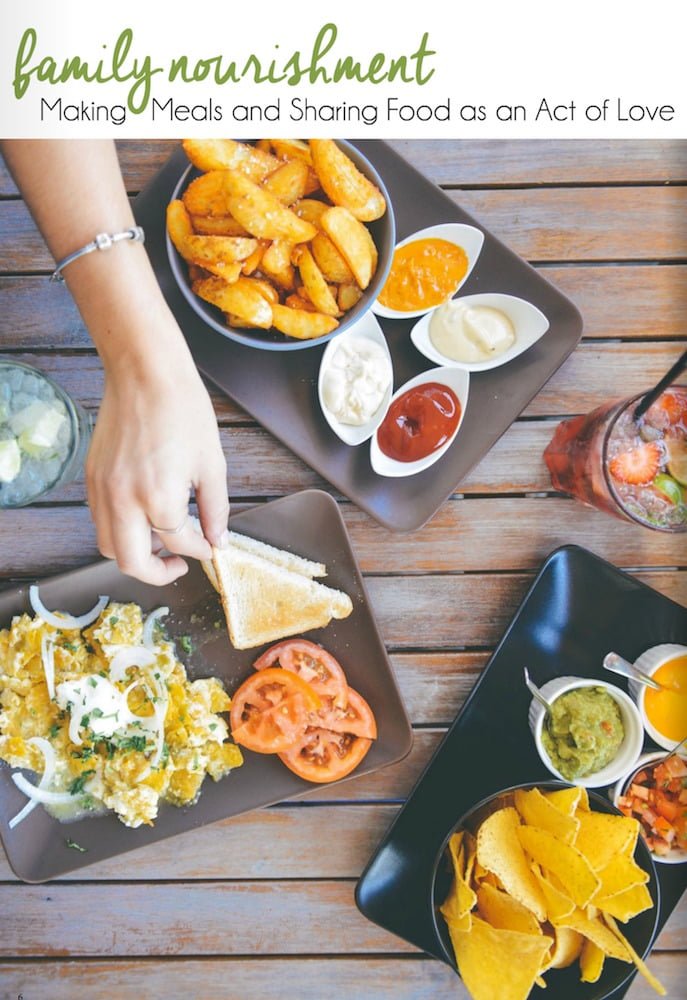The Importance of Family Meal Time: Sharing food as an act of love
When we sit down for family meal time, we are opening ourselves to more than just a moment of balanced nutrition and a healthy serving of food groups. We come together and dine to receive nourishment; to fill our cup with community, energy, relationship, shared experience and connection, as well as fuel in the form of food.
Learning how to offer this family meal time experience and reverence for eating well to our children is fundamental for developing a lifelong healthy relationship with food.
Creating community and engagement around healthy eating and meal making takes practice, though. Often, the expectation of greatness can be enough to forfeit the work put into homemade meals and as a result, we may choose convenience over homemade options.
The Importance of Family Meal Time
“We need to reboot our memory about food,” explains Tom French, founder of the Experience Food Project. “We need to focus on spending time together at the table. Our society doesn’t support this idea and as a result families are at risk, communities are taking a hit, and schools are left to deal with it.”
Teens who frequently eat with their families are half as likely to smoke or use pot than those who rarely have family dinners, according to researchers at the National Center on Addiction and Substance Abuse at Columbia University.
With the high prevalence of preventable diseases in this country and the decreased time allotted for physical activity in public schools, coupled with the heavy reliance on screen use and cars for transportation, there is now even more of an incentive to educate our children about health and nutrition. It’s more important than ever to model healthy food options in the home to help set our children up for a future as healthy adults who choose well at the market, in the kitchen, and on the plate.
As a Naturopathic Physician, I am always eager to expose my kids to a whole-foods, nutrient-rich diet, particularly emphasizing anti-inflammatory food choices and lots of fresh plant foods.
As With Most of Life, It’s All About Balance
Yet, as a mom of 3 young children, however, I often feel that I fall short of my natural parenting goals and what I would hope to provide for my children in the form of healthy, homemade meals.
I experience my personal balance to be a blend of the two; a reconciling of the ideal and reality. I think every mom can strike her relative balance that incorporates both her aspirations to provide healthy meal options and her need to juggle a home and family life.
In our family, we try to emphasize inclusion and participation as much as possible, so that the endless task of daily meal making and providing food feels less like a task, and more like a ritual. The following tips are a few suggestions on how to do just that, particularly with little children:
Here are some ways to make family meal time a priority, while keeping it simple enough to not add more stress to your life.
Involve your kids in food selection and meal prep
From meal planning, to writing a grocery list, to shopping, to meal making; there are small jobs that children can claim for themselves to feel that they are a part of the family’s need to cook and eat together. The more they can be in charge of something, be it hunting down good-looking apples in the produce aisle or stirring the soup with a ladle at the stovetop, then the more they can develop confidence and self-sufficiency in the kitchen.
Let them serve themselves
Allow each individual family member to scoop their own dishes and desired amounts onto their plates. This way they can feel they assert what they like and that they are in charge of how they nourish themselves. For the little ones, this is great work for dexterity and hand-eye coordination, as well.
Don’t stress over the spills. We all make them. Keep a stack of cloth napkins or washcloths near and they can tend to their own messes, too.
Make family meal time conversation a ritual
Ask each person about their friends, the weekend plans, or the funniest moment of their day. Demonstrate that family meal time is a time of connection by inquiring about their lives.
Show them that eating can be a calm and enjoyable experience. Put your utensil down between bites. Make eye contact. Breathe. Laugh. Just be!
Discuss tastes, colors, and flavors
Everybody has favorite foods and flavors. Discussing ingredients (especially if the kids are already familiar with them from having helped cook the dish!) helps children to understand the diversity of food options, healthy combinations and the distinction of taste with each food, herb and spice in their meal. They will then be able to practice effective communication for what they like or prefer to have less of. Again, this builds confidence and assuredness when it comes to self-nourishment.
Talk about the origins of the foods you’re enjoying
Discussing where food comes from can be a natural transition into more elaborate topics of community, economy, plant life cycles, nature’s rhythms, seasons and how we are all a part of a greater whole. A great way to learn more about the foods from different cultures is through a meal kit subscription like eat2explore. This subscription box service brings the food from 17 countries/regions like Italy, Mexico, Greece, etc. straight to your kitchen table. It provides tools for families to cook together, learn, and dine on different cuisines from around the world.
Express gratitude
Share explicit appreciation for the meals that we are able to gather, prepare, cook and enjoy together to link the act of eating to a heart centered place within. When we experience a positive feeling during shared meal time, we nurture a healthy relationship with food.
In doing so, we hold our nourishment with high esteem and find importance and value in the small tasks that add up to home made meals shared with those we love. When love is at the core of our need to nourish our families, then quick options and store bought substitutes become second-rate to the delicious and slow-cooked meals we can create out of love and with our own two hands.
Be flexible
At the end of the day, I am more concerned with how my children experienced family meal time than the specific foods they ate. Yes, homemade meals are essential for health. Still, if I need to adapt for a night or even a busy week, then allowing myself permission to let go, be easy and focus on how to nurture the relationship rather than stress over the details is key.
Trust you will bounce back and realign again to emphasize family nourishment as an act of love. In this way, health and fulfillment are a natural by-product of the work, energy and heart we put into feeding our families.


